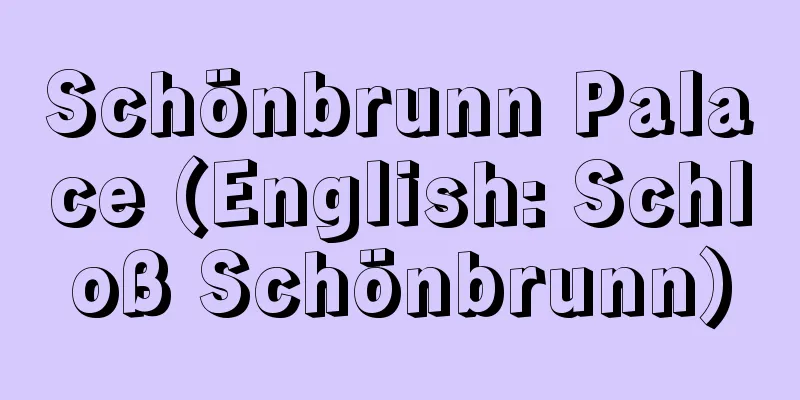Schönbrunn Palace (English: Schloß Schönbrunn)

|
Austria's largest palace in Vienna. It is a representative example of Austrian Baroque architecture, and was the royal palace of the Habsburgs for over 200 years. Schönbrunn means "beautiful fountain." The royal hunting pavilion built by Archduke Maximilian of Austria was destroyed by the Turkish army in 1683, and Emperor Leopold had this palace built on the site as a summer palace in 1695. Construction was commissioned to architect Erlach and began in 1696, who also worked on the gardens as well as the construction of the building. Later, Nikolaus Paccassi made partial modifications to the structure, and the interior was finally completed in 1749 under the reign of Maria Theresa. The only modification visible from the outside is the part in the center of the building that was raised by one floor, and the windows and the balustrade above it are noteworthy. Except for this part, the height and design of the walls of the central part and both sides are the same, and sleeves jut out from both ends to embrace the entrance. The building is painted in a unique color called Maria Theresa Yellow, and while the exterior is extremely simple, the interior is elaborately decorated with Rococo paintings and sculptures, and there are also Japanese and Chinese-style rooms. The palace, along with its gardens, was registered as a World Heritage Site in 1996 (World Cultural Heritage). [Katsuya Hamatani] A former villa for the House of Habsburg. Also known as the residence of Empress Maria Theresa. Designed by architect Fischer von Erlach, it is a representative example of Austrian Baroque architecture. World Heritage Site "Schönbrunn Palace and Gardens" (Austria, registered in 1996) Vienna, Austria ©Fam. Kanagawa "> Schoenbrunn Palace A typical Austrian Baroque garden with the "Neptune Fountain" at its center. It was designed by architect Fischer von Erlach and was arranged in its present-day form in the mid-18th century. The Gloriette (Victory Column) is in the background of the photo. World Cultural Heritage "Schönbrunn Palace and Gardens" (Austria, registered in 1996) Vienna, Austria ©Fam. Kanagawa "> Schonbrunn Palace Gardens Source: Shogakukan Encyclopedia Nipponica About Encyclopedia Nipponica Information | Legend |
|
ウィーンにあるオーストリア最大の宮殿。オーストリア・バロックを代表する建築で、200年以上にわたってハプスブルク家の王宮であった。シェーンブルンは「美しい泉」を意味する。オーストリア大公マクシミリアンが建てた王室狩猟館は1683年にトルコ軍に破壊され、95年に皇帝レオポルトがその跡に夏の離宮として建立させたもの。工事は建築家エルラッハに委嘱され、96年に開始されるが、この建築家は建物の造営とともに庭園の整備をも手がけた。のちニコラウス・パカッシイによって構造に部分的な修正が加えられ、インテリアなどに最終的な形態が整えられたのはマリア・テレジア治下の1749年であるが、外から見える修正箇所は建物中央の一階高くなった部分で、窓とその上の欄干(らんかん)が注目される。この部分を除いて中央部分と両側面は高さも壁面のデザインも同じであり、両端から玄関口を抱き込むように袖(そで)が張り出している。建物の色はマリア・テレジア・イエローという独自のもので、外観の構成がきわめて簡明であるのに対し、内部のロココ様式の絵画、彫刻による装飾は入念を極め、日本、中国風の部屋もある。この宮殿は庭園とともに、1996年に世界遺産の文化遺産として登録されている(世界文化遺産)。 [濱谷勝也] かつてのハプスブルク家の離宮。女帝マリア・テレジアの居城としても知られる。建築家フィッシャー・フォン・エルラハの設計によるオーストリア・バロックを代表する建築である。世界文化遺産「シェーンブルン宮殿と庭園群」(オーストリア・1996年登録) オーストリア ウィーン©Fam. Kanagawa"> シェーンブルン宮殿 「ネプチューンの泉」を中心とするオーストリア・バロックの典型的な庭園。建築家フィッシャー・フォン・エルラハが手がけ、18世紀中ごろに今日の形に整えられた。写真後方はグロリエッテ(戦勝記念堂)。世界文化遺産「シェーンブルン宮殿と庭園群」(オーストリア・1996年登録) オーストリア ウィーン©Fam. Kanagawa"> シェーンブルン宮殿庭園 出典 小学館 日本大百科全書(ニッポニカ)日本大百科全書(ニッポニカ)について 情報 | 凡例 |
>>: Cienfuegos (English spelling)
Recommend
Notes on the primitive system of vowels in Indo-European languages
...In addition, since 1955, the unpublished manus...
Economist Francais - Economist Francais
…He wrote many major works, including “General Th...
Transition Rites - Ikougirei
…In a broader sense, rites of passage also includ...
Bao Dai
The last emperor of the Nguyen Dynasty of Vietnam ...
Yoshinori Onishi
A Taisho and Showa era aesthetician. Born in Toky...
Desiderio
...Customs and names also rapidly became Germanic...
Pheasant Bank - Pheasant Bank
…Both males and females take turns incubating and...
Regional plan
A plan for what kind of library system should be b...
Omaeda Eigoro - Omaeda Eigoro
Year of death: February 26, 1874 Year of birth: 17...
Agricultural system
…Physiocrats (physiocrates) called themselves eco...
Fagopyrum tataricum (English spelling) Fagopyrum tataricum
…[Yoshiharu Iijima]. … *Some of the terminology t...
Rasbora heteromorpha (English spelling)
...Their characteristics are the same as those of...
Oliver Wendell Holmes
1841‐1935 American jurist. Born in Massachusetts. ...
Biblical Hebrew
...On the other hand, since the invaders themselv...
Club San Gakuha (English spelling) L'école de clavecin
A general term for harpsichord (clubbing) composer...









